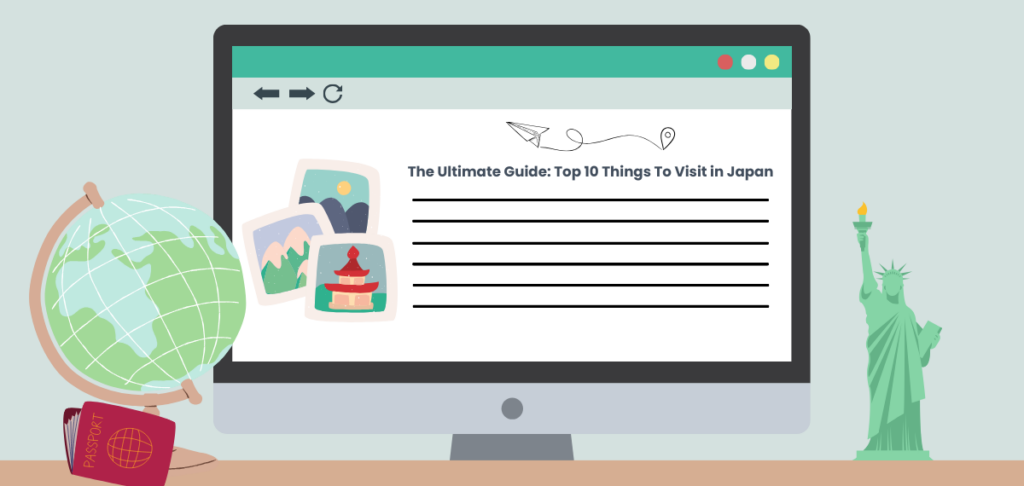Travel writing is the art of writing about the different places you travel to. Imagine combining your passion for exploring the world with the craft of storytelling that gets shared with others. That’s travel blogging! Some do it for fun, for their own blogs or social media, but others pursue it as a career avenue.
As a freelance niche, travel writing offers so much room for creativity, sharing insights and personal opinions, and experiencing a world of diverse cultures. Whether it’s through travel blogging, articles for magazines, or content creation for travel websites, my quick but detailed guide will walk you through what it takes to be a travel writer.
Are you ready to start traveling? Well, read over my tips and advice first, then apply them to your writing career! I cover everything from the skills and tools you need to become a travel writer to tips on how to get started. Let’s go!
What Is Travel Writing?

Travel writing is a form of narrative storytelling that takes your readers on a trip to new or even familiar places. This specialized type of blogging goes beyond mere descriptions of destinations.
It’s meant to be an immersive experience for people wanting to travel, blending your personal anecdotes, cultural observations, and any practical advice you can lend to help others have the best trip ever.
It could be sprawling, bustling cities or hidden gems and peaceful landscapes. Either way, travel writers are the connection between the world and the reader, giving them a window into so many cultures and experiences.
However, travel bloggers should also highlight the downsides of a location or experience. People flock to this content to get a real idea of a destination before they book a ticket. They want to know where the best food is and what restaurants to avoid.
They want to hear about the best excursions or entertainment and which ones are not worth the time or money. They’re relying on you to give them a well-rounded, unbiased opinion so that they can easily plan their vacations.
A couple of years ago, my husband and I were neck deep in planning a trip to Disney with our two kids. We were super excited about the new Star Wars experience and were willing to pay an astronomical price to stay there, too. The website, the social media influencers, etc. made it looks so amazing!
But I read a couple of travel blogs that gave first-person overviews of their actual experiences with the new Disney addition, and it wasn’t good. The rooms were tiny, the beds were in cramped little cubbies in the wall, the food was bland, and so much more. We decided to pass on it, and now the Star Wars experience is being discontinued due to lack of interest and poor reviews.
Real opinions matter, people! With travel writing, people depend on you and trust you. Tell them the good, the bad, and the ugly.
What Are the Key Elements and Characteristics of Travel Writing?
It’s not like regular blogging or content writing. It’s more personal, and there’s a level of storytelling that comes with it because you can’t just say, “Hey, this place was fun. You should go.”
Readers want to hear the what, the how, and the why of how you decided it was a destination worth traveling to. Here are my top elements of good travel writing.
Storytelling and Personal Voice
Your unique perspective is what brings a destination to life. Sharing personal anecdotes, experiences that happened to you, and other reflections you have about the location makes each piece resonate more deeply with your audience.
Evocative Description of a Place
It’s all about painting a picture with words. Your aim here is to make the readers feel like they’re right there with you, exploring every nook and cranny of a place, tasting every dish, and smelling every scent.
Insights into Local Culture and Experiences
Travel writing should dig deep into the heart of a destination’s culture. From local customs to cuisine, the small details offer the most rewarding insights. Not all travelers want to soak up the sun and drink margaritas. Some love to experience other cultures and want tips on how to show respect, where to find certain places, local festivals, etc.
A Blend of Factual Information and Personal Reflection
While your readers are just sinking into your journey to different places, also provide them with useful information, like tips for getting around a city, the currency conversion, how much basic things should cost, and tourist traps to avoid.
What’s the Scope of Freelance Opportunities in Travel Writing?

The world of travel writing, just like the world itself, is so vast and varied, with countless avenues to explore. Here’s a quick idea of the specific types of travel blogging you could do.
Destination Articles
These pieces provide readers with a super detailed look at a specific location, including what to do, see, and eat. Think of it as a total rundown, a crash course on a certain place, so readers can find everything they’re looking for in a single click.
Travel Narratives and Memoirs
These are a bit more personal and reflective. If you’ve got a knack for fiction writing, then these real-life stories might be for you. They focus on the writer’s personal experiences and transformations during their travels. The idea is to create a bit of FOMO (fear of missing out) and inspire others to want to visit the same place so that they can have similar experiences.
Travel Blogs
These tend to be quicker and shorter than feature articles or stories. They could be anything from your personal travel diary that you post while on the trip to professional travel advice columns. The point of travel blogs is to provide readers with short-n-sweet travel tips.
Travel Guides
Probably my favorite type of travel writing because I’m THAT person. These informative pieces help plan trips right down to the very last detail, offering in-depth information on destinations, accommodations, food, fun, and itineraries.
What Are Essential Skills for Travel Writers?
Like all forms of writing, certain skills are just non-negotiable. Here’s what it takes to be a great travel writer.
- Strong Writing Ability: Clear, engaging, and compelling. That’s the narrative style needed here.
- Research Skills: If you love digging deep into the history, culture, and subtleties of destinations, then you’re golden.
- Photography: People are visual consumers. They see, they want. Capturing striking images can complement your narratives and draw readers in more than just words.
- Social Media Savviness: Platforms like Instagram and TikTok can be powerful tools for sharing your work and connecting with readers.
- Adaptability: Being open to new experiences and able to write about them from various angles is pretty crucial.
Building a Freelance Career in Travel Writing: How to Get Started in Travel Writing

My motto is to just dive in and figure it out. But if you want to kickstart a career as a travel writer, here are the key things you need to prep before jumping in headfirst.
Build a Good Portfolio
Start by writing about local destinations or your past travels. Those are easy pickings; you can build a beautiful portfolio without traveling anywhere. Any experience is valuable and showcases your style and insight.
Develop a Strong Writing Style
Your voice is your trademark. Find it, hone it, and share it. A unique voice will help you stand out in the crowded travel writing space.
Research Potential Outlets and Pitch Effectively
Spend some time looking for great travel magazines, blogs, and websites that align with your interests and pitch your ideas to them. Tailor each pitch to the outlet’s tone and audience. You never know who you’ll reach!
Are You Ready to Start Travel Blogging?
Starting a career in travel writing is an adventure in itself! With passion, perseverance, and a knack for storytelling, you can turn your worldly (or local) travels into beautiful narratives that captivate and inspire others to expand their worldviews.
Remember, the world is alive with stories waiting to be told through your unique lens. So, take the first step, explore the unexplored, and start crafting your own path in the wonderful world of travel writing. If you found my guide helpful, check out my other tips for different fields of writing right here on our site.
